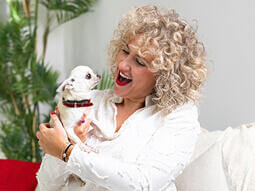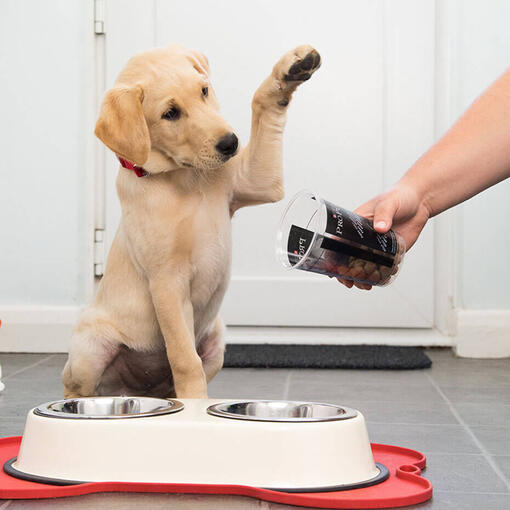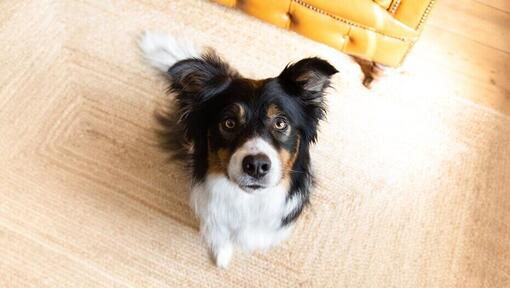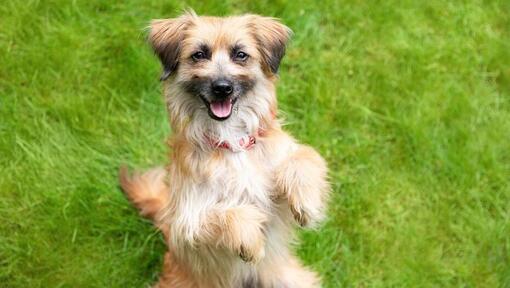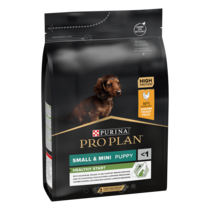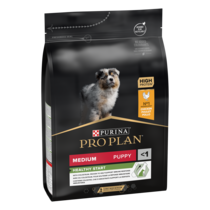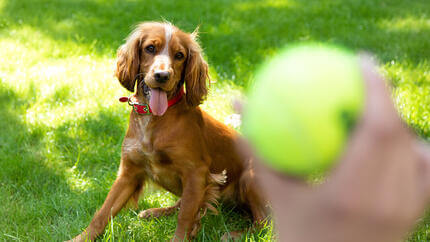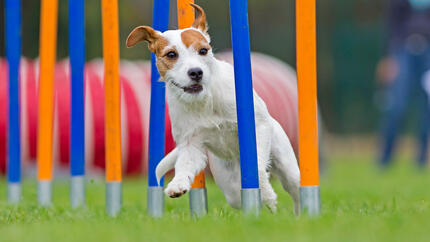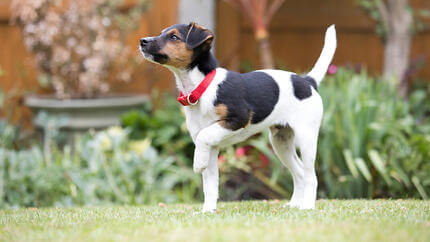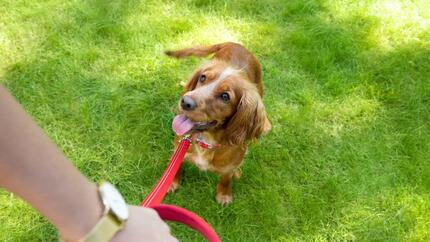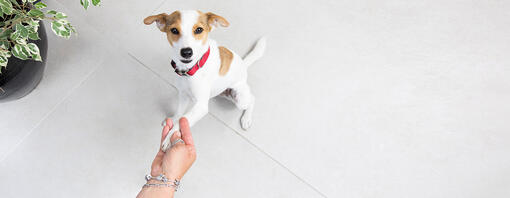

Now that your pup knows basic dog training, it’s time to teach them some cool dog tricks! Read our step-by-step article for advanced training top tips.
We all love the idea of having a well-trained dog who hangs on our every word – and now your puppy has all the basics under their belt, it’s time to move on to the more advanced dog training techniques. Learning new tricks and games with your dog is going to benefit you as much as will benefit them and it will enhance your relationship as a result. It’s a win-win!
Some of these fun dog tricks are based on mastering basic dog training skills, so if you need a refresher make sure you check our article first.
How to focus your dog’s attention for learning dog tricks
Having a dog who will give you their attention when you ask means they are ready to listen to you, and this is the first step in every other part of your advanced puppy training. The fun dog tricks below require your puppy’s attention for the learning process to begin. There’s no point asking your dog anything if his mind is elsewhere!
Teach your pup to look at you when you say his name. This is something you should have been doing since puppyhood, but this is a good time to have a refresh. Have treats in your pocket while you’re in the house or garden. At various times when your dog isn’t expecting it, say their name brightly and enthusiastically. If they look at you, drop a treat on the ground between you, so the dog moves towards you to get the treat.
You are teaching the puppy that their name means “give me your attention and good things happen”. Start doing this when there are no distractions and build it up until you can do it everywhere, no matter what is going on. Positive association like this is an important step in advanced dog training.
Top tips for teaching your dog tricks
- Be patient. It can take several repetitions over a few days before your dog gets the hang of these advanced tricks. Arm yourself with plenty of patience and treats before every session.
- Keep the sessions short. Even when you’re the master of your pup’s attention, dogs will cease to be interested in what you have to say if the training goes on for ages. Limit the sessions to a few minutes each. It’s better to have multiple short dog tricks training sessions a day than a long one lasting the entire afternoon.
- Don’t scold your dog. They’re doing their best to learn, so even if it takes longer than you expected, be calm and keep the training fun and exciting. This way your dog will be more likely to enjoy it and more willing to go through many iterations of the same routine to get it right.
5 Cool dog tricks to teach your canine friend
This dog trick is easy to do indoors, is good fun and all you need is some treats or some of your dog’s daily food allocation. The aim is for your dog to weave in a figure of eight around your legs.
- Stand with your legs apart and hold a treat in each hand.
- Lure your dog from front to back using the treat in your right hand.
- As your dog follows your hand, lure her around the outside of your right leg to the front, before she goes through your legs, and offer the treat.
- Now, bring your left hand behind your left leg and lure your dog through your legs and around the outside to the front again.
- This completes the figure of eight so you can offer the second treat.
Top Tip: Practice the hand movements before you bring your dog into the equation! Once you have the movement down to a fine art and your dog is happily following your hands through the figure of eight you can introduce the cue word, which might be ‘weave’ for example.
After you have practised a few times with the treat reward, see if your dog has associated the cue word and ask your dog to ‘weave’ without the initial lure. If your dog doesn’t weave on cue immediately, just keep practising in short bursts and they’ll soon associate the word with the movement.
When your dog does follow the cue without the treat as a lure, make sure you still reward the weave at the end. This is a fun dog trick and they should enjoy and be paid for a job well done.
This isn’t just a cool dog trick; it’s potentially a game-changer. How many times have you lost your keys and wished you had a magic key-finding buddy at your service? Well, here’s your chance to create that buddy.
Before you get started, make sure that your keys are easy for your dog to pick up. Attach something soft to the key ring, maybe a small soft toy or a handkerchief.
- First of all, just sit with your dog and play a basic retrieve game with your keys. Just rattle them yourself, put them down and rattle them on the floor and praise your dog as she takes an interest in picking them up. When she does, say ‘keys’ and offer lots of praise, take them from her with a drop/out cue and play again. The aim is for your dog to be comfortable picking up the keys and dropping them in your hands when you ask.
- If you gradually increase the distance between you and the keys, your dog will start to get used to picking them up and bringing them to you.
- Make this an exciting, high energy and well-rewarded game so when your dog drops the keys in your hands, they’re paid well.
- As you’ve been playing, your dog will have started to pair the word ‘keys’ with the item they’re carrying, so we can now add the element of ‘find it’ to the game.
- Leave the keys with a couple of other items and ask your dog to ‘find the keys’ which will show you whether she has understood the cue of ‘keys’.
As you practice this in different places around the house, remembering to make it fun and keep it well paid to help your dog respond quickly and understanding what is being asked of her.
Now you can discreetly hide your keys, wait a little while and then ask your dog to ‘find the keys’. If she doesn’t find them straight away or finds an alternative to keys, don’t worry, just ask again. If it’s quickly obvious that she’s not sure what you’ve asked her to do, just go back a step and practice that a bit more.
When your dog can easily find your keys from anywhere in the house, it’s time to up your game. Head out into your garden, or try this on walkies. Start by ‘accidentally’ dropping your keys and encouraging your dog to pick them up for you. Do this a few times and then ‘accidentally’ drop your keys, say nothing, and see how your dog responds. Give lots of praise and a decent treat for a positive choice and if your dog decides you can pick up your own keys, that’s ok too! You can try again when there’s less distraction and after some more practice of asking first.
One thing to remember… if you have a tendency to leave your keys lying around, your dog will learn that bringing them to you is rewarded. So, be prepared to praise and reward every time so that your dog knows they are doing the right thing, or tidy up your keys and leave them somewhere safely out of reach!
For this game, it’s important that your dog is used to retrieving or you’ll end up with ripped up tissues all over your house! The aim is to teach your dog that the sound of a sneeze is a cue for them to collect and then bring you a tissue.
- Put a tissue on the floor and sit nearby as you ask your dog to fetch it. If they’re used to retrieving, they should bring it to you, or use whatever cue your dog is used to when retrieving.
- Put a tissue on top of a tissue box and do the same again, asking your dog to fetch it and bring it to you. Remember to praise and reward when you have the tissue, not before.
- When your dog is consistently picking up the tissue and bringing it to you, add the cue-sneeze. Sneeze, then ask your dog to fetch the tissue. Praise and reward when you have the tissue.
- Repeat, repeat, repeat. Oh, and it’s best to teach this when you don’t have a cold/hayfever or the learning takes a while, they’re controlled sneezes, to begin with!
- When you think your dog has associated the sneeze with the action of fetching the tissue, put her to the test.
- If she does it, that’s brilliant.
- If she doesn’t – that’s also brilliant – she has shown you that she needs more time to practice and make the connection.
Keep reminding your dog of the new cue and play the game regularly. The next time you have a cold, you’ll be grateful!
Scent games are always a winner as your dog will be using their natural skills and will wow you with their expertise. Start playing this, make the words ‘Find It’ mean something specific to your dog and watch them come to life.
- Start with small pieces of food.
- Ask your dog to sit & let them sniff the food (in a closed hand so s/he doesn’t try and eat it).
- While s/he’s sitting hide a couple of pieces of food somewhere you’re happy for her/him to be. It’s a good game to do in the garden! If you don’t have a reliable sit/stay then just hide some treats before you invite your dog to join you and keep a couple back for them to sniff.
- Release your dog from the sit by saying ‘find it’ and make it fun… be fully engaged and enjoy yourself.
- Keep repeating ‘find it, find it’ as your dog is searching for the food… a little bit like the ‘hot/cold’ game, as s/he gets closer make the cue more excited and if s/he’s not going towards it, ease off the ‘find it’ cue. Basically, the closer your dog gets to the treat, the more excited you get.
- When s/he has found all the treats, call her/him to you, give them lots of fuss and say ‘finished’ so s/he knows the game is over.
You can develop this fun dog trick by making things harder to find, changing the thing you’d like your dog to find, increasing the distance between the items or hiding them in different places.
Everyone needs a way to celebrate with their dog, and high-fiving each other has to be the best way. Here is how to teach this cool dog trick:
- Ask your dog to sit.
- Show your dog the treat to get their interest.
- Then hold the treat in your palm and while you’re positioning your hand vertically (with the treat facing the dog) curl your fingers over it.
- At this point your dog should try to smell the treat or even lick it. Wait until they try to get it with their paw and then say ‘high-five’ and reward them.
- Repeat this a few times and once your dog completes their high-five all by themselves, reward them with a treat from your other hand.
- As your dog gets used to this new trick, you can remove the treat completely to encourage your dog to offer their paw just based on your high-five cue alone.
How to teach dog tricks to more than one dog?
If you’re spending your days with more than one dog it’s a good idea to have one-to-one time with each dog while you’re introducing a new activity.
Not only will it enhance the bond you have with each dog, but you’ll also be able to tailor and adapt the session to suit the way they learn.
If you’re worried that your dogs might become grumpy with each other in the presence of new toys or treats, then think about the best way to learn on a one-to-one basis.
What to do when dog training doesn't go as planned?
Yes, teaching your dog tricks and games can be frustrating, but keep in mind that you have the written instructions, your dog doesn’t!
Reconsider your goal
Have realistic aims when you’re introducing new tricks and games. These ideas are based on force-free fun so the best case is your dog learns a reliable new cue or fully engages in the way you’d like. The worst case is you both have a good time, your dog gets a few treats and they’re reminded that you’re a fabulous person to be around!
Work on your message and timing
Take a step back, have a break and think about what you were doing during the session. There’s a chance you’re not making the message clear to your dog so, think about breaking down the steps further or work on your timing. Don't forget, this is supposed to be fun!
Remember, there's no pressure
We’re sure that if we asked you how much your dog loves playing, your eyes would light up as you told us all about how much fun your dog has with her/his favourite game. Now, be honest, how many different tricks and games have you taught your dog?
Not many, right?!
That’s ok, you have all the time in the world to introduce some new tricks and games, keep the sessions short and remember; there’s no pressure for you or your dog.
Ultimately these advanced dog training techniques are a fun and exciting bonding experience that will set you up for a happy and healthy life together. For even more bonding ideas discover games you can play with your dog and get inspiration from out top 5 fun puppy sports list.
